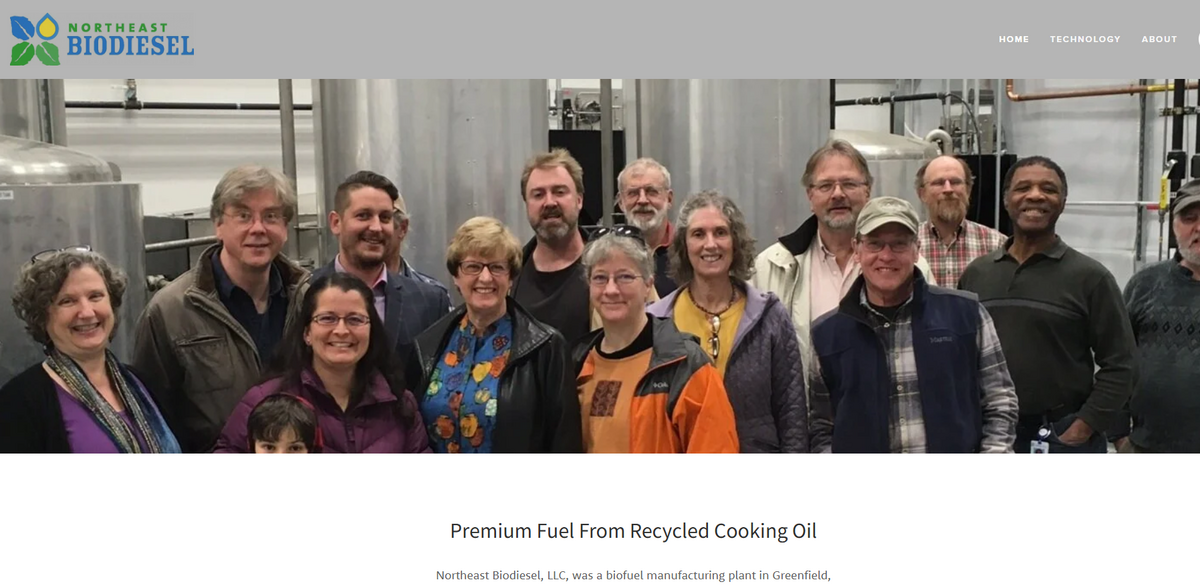What the Project Is
Northeast Biodiesel, LLC, was a biofuel manufacturing plant in Greenfield, MA, committed to producing high quality, renewable fuel in the most sustainable way: with recycled cooking oil. The premium biodiesel, produced with genuine care and attention, was designed for use in any oil heat system or diesel engine, reducing carbon emissions, improving engine performance, and enhancing air quality. Sadly, the business went out of operations when federal incentives for biodiesel dropped. Appreciation remains for the strong support received over the years. Beyond fuel production, a robust Community Biofuel Cycle program was developed—collecting used cooking oil locally, turning it into biodiesel, and delivering it back to community members, thereby fostering a local, sustainable energy future.
Main Benefit
The advantages realized by Northeast Biodiesel were numerous and centered on efficiency and community uplift. Benefits include:
- Premium biodiesel produced using recycled cooking oil, transforming waste into valuable fuel.
- An efficient FuelMatic biodiesel processor that used less than 50 kWh per ton of biodiesel produced.
- A high product yield of 1.01 liters of biodiesel per liter of input oil, ensuring remarkable resource efficiency.
- The distinctive ability to process both used vegetable and animal oils—the only processor on the market with this versatility.
Each of these points highlights the strong technical foundation of the project, showing that even with modest energy inputs and careful processing, sustainable solutions could be reached. This dynamic approach helped improve air quality and engine performance, making the whole initiative a win for both the local community and the environment.
FuelMatic Processing Technology
The FuelMatic biodiesel processor was central to the project’s innovative approach. The process began when the feedstock was heated and measured into reaction vessels. There, methanol and methylate were accurately injected into the flow. Once the reaction was complete, the mixture of crude biodiesel and crude glycerine was channeled through the GSX separation unit, where the two products were cleanly separated and the glycerine was then discharged to storage. Afterwards, the crude biodiesel passed through an extensive purification process where any impurities were removed using an ion exchange process. Finally, the residual methanol was recovered for reuse and the resulting biodiesel was automatically discharged to site storage. This detailed processing sequence showcased a blend of precision and innovation… a true testament to sustainable industrial practices.
Community-Based Approach
The project was not just about technology—it was equally about community. Through its locally developed Community Biofuel Cycle program, used cooking oil was collected from local residents and businesses, turning what might have been waste into a vital energy resource. Collaboration with Co-op Power, a renewable energy cooperative owned by consumers from around New England and New York, further underpinned a shared regional commitment to sustainability. This community-based approach served as a bridge between eco-friendly practices and everyday life, inviting local stakeholders to participate in reducing carbon emissions and improving air quality. Such collaboration encouraged a sense of pride and actively demonstrated that sustainable energy solutions are best achieved when the community is actively involved.
Sustainability and Efficiency
The project stood out for its relentless pursuit of sustainability and operational efficiency. By restarting the life cycle of used cooking oil into premium biodiesel, Northeast Biodiesel championed both recycling and innovative fuel production. The FuelMatic processor, with its low energy consumption and high output yield, provided a fine example of how modern technology can be harnessed to meet environmental challenges. Moreover, this initiative demonstrated that sustainable practices could be seamlessly integrated into community infrastructure, offering a glimpse of a future where renewable fuels are both viable and widely accessible. While the winds of economic change eventually led to the business’s closure, the legacy of combining efficiency with eco-friendly practices continues to serve as an inspiration for future renewable energy projects… marking a clear pathway toward a greener tomorrow.
Project Impact
- SDG 7: Affordable and Clean Energy
- SDG 11: Sustainable Cities and Communities
- SDG


















